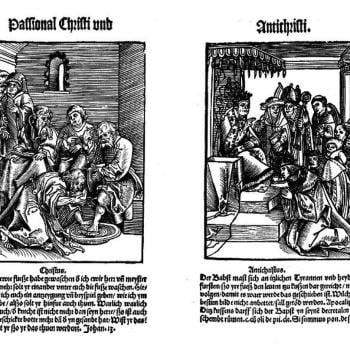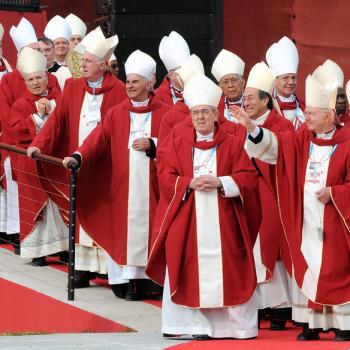How good of you to write! I had wanted to come back to Maryland on the day you were speaking and to hear the reading of your play about Leonardo da Vinci and Machiavelli. That would have been some long drives, but then I got sick, making it all a moot point. So I greatly appreciate your responding to my review, and going so far as to address some of my questions. And to give me a copy of your play is extremely generous and helpful. Just leafing through it shows me an abundance of things I missed.
Would you mind if I posted your comments about your play on my blog? Speaking as the English professor that I am, what you say about your intentions could be of great help to future students and directors of your play, which I really do believe has artistic staying power. Would that they had blogs in Shakespeare’s day so that he would explain what he had intended with that Hamlet character!
Your explanations about the points I had some problems with are very helpful. With Faust, it is true that he is an archetype. But he is an archetype of a man who sells his soul to the devil; that is, the archetype of a man who wants something so badly (knowledge in Marlowe; experience in Goethe; artistic success in Thomas Mann; the American dream in St. Vincent Benet) that he would give up his soul for it (in all the senses that can mean). So for the archetype to fully work, it seems to me, the character has to pay a price, a tragic price, for what he yearns for. Yes, in Marlowe, he is damned, though it’s evident that he doesn’t have to be, that he can repent and is close to repentance till the very end, but in that last scene, when he opens his mouth to pray for rescue to Christ, he ends up praying to Satan instead. In Goethe’s version, he is indeed saved, but only because Gretchen, an innocent and naive girl whom he seduced, got pregnant, and drove to suicide, nevertheless forgave him and interceded for him in Heaven. Thus, he is saved because he is redeemed–by the innocent suffering and death of Gretchen rather than Christ, but the meaning is the same–but this also involved his guilt and his attempt to atone for that guilt by using his powers in an effort to do good. All of the manifestations of the Faust archetype have that tragic dimension that I missed in yours. I do recall some lines that might point in that direction, and I suspect when I read your script I will see it more, and, after all, you were writing a comedy rather than a tragedy, but still. From another angle, there is this: Goethe’s Faust is all enamored with the Eternal Feminine, of course, but what he forgets is that Gretchen is not just his ideal, but an actual, particular human being, whom he ends up, with all of his narcisstic idealism, destroying. You did have that great moment in your play in which the prostitute refuses to go along with Faust’s Eternal Feminine fetish to his great agony, but she isn’t quite the Gretchen figure whom he victimizes, feels remorse for, and yet surprisingly experiences her unmerited love. I think that kind of humanizing of the Eternal Feminine character a little more would have also made the sexual stuff seem less coarse. But, again, my dissatisfaction with the Faust figure–my sense that his destiny is not prefigured in the way Luther’s and Hamlet’s is–does not mean that I don’t love the play!
The depth of learning that has gone into this play is staggering. I mean, I have taught “Hamlet,” Marlowe, and Goethe for years and have a personal interest in Luther, being indeed a Lutheran, but your references and allusions and underlying structures and all are rich and perceptive. So you knew about Rheticus, who inspired you for the masterful things you do with the Copernical cosmology and how disorienting that had to be. Knowing more than you actually use, while drawing on it, is a sign of true scholarship, and that you handle it so lightly and so wittily is a sign of true mastery.
Can I ask where you come down on these issues? You know your theology. Do you consider yourself a Christian of any kind? I know artists don’t like to answer questions like that, but I won’t categorize you. I am just curious.
Anyway, as Emerson said to Whitman, with the same sense of discovery that I feel, I greet you at the beginning of a great career. (Though I’m sure “Wittenberg” isn’t the actual beginning, since you must have gained a lot of experience already to have written such a good play.) I’d like to follow what you’re doing–hearing about other productions of “Wittenberg,” hearing about what else you are working on, and just being a fan.
With many regards and accolades,
GENE












